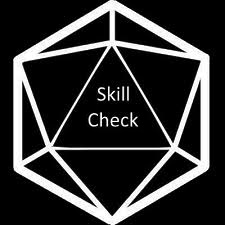Alternate Ability Gifts
By Anthony Casperson
9-5-20
The paladin’s player wants to persuade a king to pursue a particular course of action. Desiring to keep some enemy from escaping, the fighter’s player asks to grapple the fleeing culprit. Or the wizard’s player is trying to figure out the importance of a certain glowing rune.
Each of these instances in a D&D game calls for a skill check. The player rolls a 20-sided die and adds their character’s skill bonus depending on the particular skill needed in the given situation. (Persuasion, Athletics, and Arcana, for the three examples above, respectively.)
To figure out the particular skill’s bonus, each is normally paired with one of the six Ability Scores (Strength, Dexterity, Constitution, Intelligence, Wisdom, or Charisma). And if the character is specifically proficient with a skill, they would add a number (which slowly increases as the player’s character levels up) to create the skill’s total bonus.
Therefore, each of the skill checks would be called as the Ability followed by the particular skill. The paladin’s check would be Charisma (Persuasion). Strength (Athletics) is for the fighter’s check. And the glowing rune calls for the wizard to make an Intelligence (Arcana) check.
However, recently, I was reminded that there is an optional rule that allows a skill check to be made with an Ability outside of its normal use. The most common alternate Ability skill check is a Strength (Intimidation) check. Here, it’s less about the player having their character using charm and words to invoke a fear-filled response (which would be the skill’s usual Charisma Ability), and more about letting their muscles do the talking for them.
With this alternate Ability skill check system, pretty much any Ability could be used for the creation of a skill check, if there could be a sufficient reason for the alteration of the norm. (Though, I’d really like to hear the reasoning behind a Strength (Arcana) check.)
While this is a game-ified system to explain how players have their characters interact with the cooperative story-telling experience of an RPG, this idea of people using personal skills in an alternate manner is something that actually does happen.
For instance, some people attempt to persuade others of something by using stats, facts, and figures. Meanwhile, someone else could tug on the heartstrings of others to persuade them of the same thing. The position that someone tries to persuade others to accept is exactly the same, but the method of the persuasion is very different. And numerous other methodologies exist as well.
The thought of alternate abilities, of using a skill or something similar in a method other than how we normally think it’s used, came to my mind while in a discussion about spiritual giftedness. Particularly preaching, but it’s true of any spiritual gift. I’m just going to explain my thoughts regarding this with preaching, because that’s one of my gifts, and my point in that discussion. Other followers of Jesus can insert their own gifts into this idea as well.
Quite often (at least as far as I’ve seen), there’s this concept that when a preacher is excited and screaming the truth of God at the top of their lungs, and the people engaging with the sermon are shouting back “Amen,” that is when they’re really preaching. This charismatic force of will builds up the people of God to rally behind his work. It’s a concept which creates a perspective that only people of certain levels of personal charismatic gravitas can really preach.
It’s a false perspective because God is able to use many different types of people to perform his work. (And it’s also dependent on the moving of the Spirit more than how moving the preacher is.)
My example in the discussion was of God’s mighty work through a very un-charismatic preacher who wanted nothing to do with speaking God’s grace to his audience: Jonah.
(I understand that using an example of a person who sinfully ran away from God’s call can be dangerous. Especially, when they had yet to actually repent by the moment I’m showing as testimony. And even more so when that example didn’t want to offer God’s forgiveness to the enemies of Israel, which was his reason for running away. But I think it proves the power of the Spirit using God’s calling on a person via alternate abilities all the more.)
So, here’s the prophet Jonah coming to the capital city of the people who would take captive the Northern Kingdom of Israel in a generation or two. He’d been told by God to preach to the Ninevites that judgement was coming from the God of Israel if they didn’t repent. He’d run literally the other way, boarding a ship to get as far away from the Ninevites as possible.
God had sent a storm against the ship, causing Jonah to tell the sailors to throw him overboard and everything would go well for them. They had tried everything they could to not toss the prophet, but ultimately they did, and the storm calmed immediately. (This caused the sailors to worship the God of Israel, already making Jonah a rather productive reluctant preacher.)
Sending a large fish to swallow the prophet whole, God had directed the creature to swim back toward the eastern side of the Mediterranean. In the belly of the beast, Jonah had given a beautifully poetic statement of calling out to God, which seems to be more style than substance, because after the prophet had finished, the fish threw up. (Coincidence? Or proof that there was something fishy about the “repentance?”)
Tired, hungry, dehydrated with stomach-acid-bleached skin, patchy hair, and smelling like fishy bile, the prophet then had several hundred miles of arid desert travel in order to reach Nineveh ahead of him. It wasn’t likely that anyone would want such a vile creature to join them in their caravan. And the prophet definitely wasn’t going to try running again.
This prophet walked through the gates of the city to preach the truth of God. Did he yell and scream? Was there an element of personal charismatic gravitas? It doesn’t seem so. Not only, if he were a D&D character, would Jonah have had a penalty to his Charisma because of the lasting effects of his partially digested state, but his heart was not in his words.
In the English translation, his sermon is eight words long. However, in the Hebrew it’s only five. And when we read these words, I believe it should sound more like it’s coming from the mouth of a 16-year-old woken up early in the morning by their parents on the first day of school. “Yet forty days, and Nineveh shall be overthrown.”
And yet the king tore his robes in repentance and all the people who heard it followed suit. Now that’s what I call preaching. God using even a miserable, half-hearted few words to change the trajectory of hundreds of thousands of human lives.
This certainly wasn’t a Charisma (Preaching) check made by the prophet. That roll would never succeed. I think part of the success of the words (beyond God’s miraculous work) came as a result of the people seeing what God had done to his prophet. When a guy who looks that beat up trudges through the city saying that judgement is coming, it’s kinda worrying. If God was willing to do that to his prophet, what would he be willing to do to those he sought to punish.
Let’s call it a Constitution (Preaching) check.
A sense of charisma wasn’t needed for the Spirit to rest on the prophet and fulfill his calling. And amazing work happened in spite of not having any. God is able to use different methods to achieve his work through our spiritual giftedness.
It’s the same for all of us, we who follow Jesus. Just because we don’t fall into the category that most people assume needs to be met, it doesn’t mean that we’re not gifted by God to it, called by his Spirit to join him. It just means that there’s an alternate ability for the gift.
Never assume that a spiritual gift has to look the exact same for everybody. God often uses what we have uniquely experienced to accomplish his work. Hopefully, those experiences have less to do with sin than Jonah’s did, but even then, God has shown himself able.
An alternate ability gift might just be called for.




